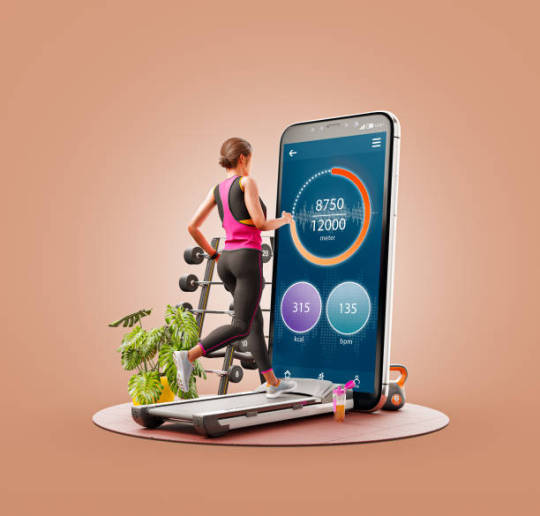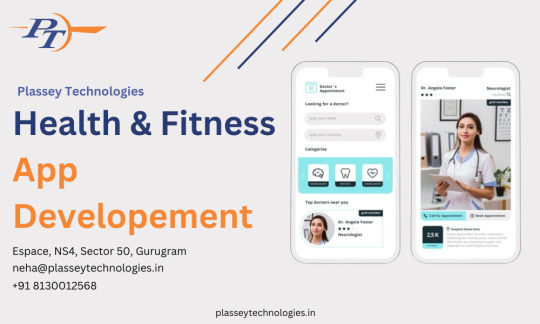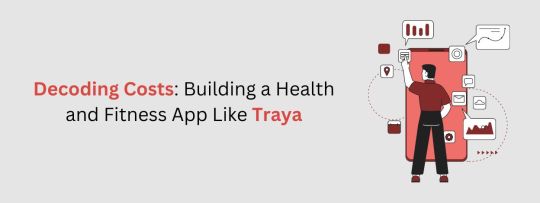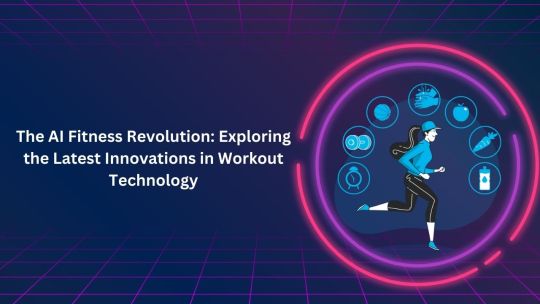#Health and fitness App Development
Explore tagged Tumblr posts
Text
Savvient Technologies leads the way in building health and fitness apps for a better future. Our innovative solutions empower users to track goals, monitor vital signs, and access personalized workouts from anywhere. Seamlessly integrating with wearables, we provide real-time insights to inspire active lifestyles. Join us in shaping a future where technology fosters healthier living for all.
1 note
·
View note
Text
The demand for health and fitness apps is high. This is why many investors invest millions of dollars into mobile apps such as Strava. Apple and Google have also entered the field. Health and fitness app development is a very exciting area. Apple Watch and WatchOS include elements for developing health and fitness apps. It is a big step forward in this direction.
0 notes
Photo

(via 5 Best Fitness App Development Companies in USA - Networkblogworld.com)
2 notes
·
View notes
Text
Rural Healthcare Crisis? Telemedicine Has Entered the Chat
Telemedicine is transforming healthcare delivery through digital innovation. The development of custom telemedicine app development solutions has enabled healthcare providers to offer remote medical services that revolutionize patient care. From video consultations to remote monitoring, these technological advances have expanded healthcare access, lowered costs, and enhanced patient outcomes. The COVID-19 pandemic accelerated adoption across medical specialties, pushing healthcare into a new digital era.
The healthcare landscape has evolved dramatically with on demand healthcare tech solutions reshaping how medical services are delivered. This transformation encompasses virtual consultations, electronic health records (EHRs), mobile health applications, and AI-driven healthcare platforms. The concept originated in the 1950s but gained momentum with modern digital communication advances, becoming essential during the global pandemic.
Modern telemedicine comprises several key components: virtual consultations through video calls or messaging, remote patient monitoring (RPM) using wearable devices, electronic prescriptions, and integrated telehealth platforms. These elements work together to create a comprehensive digital healthcare ecosystem.
The benefits of telemedicine are substantial. It eliminates geographical barriers, making specialized care accessible to rural and underserved populations. Patients enjoy the convenience of home-based consultations, particularly beneficial for those with mobility issues or chronic conditions. The cost-effectiveness extends to both providers and patients, reducing hospital readmissions and operational expenses.
Patient engagement has improved significantly through telemedicine. Individuals actively participate in their healthcare journey by monitoring personal health metrics and engaging in virtual consultations. This approach particularly benefits chronic disease management, allowing continuous monitoring of conditions like diabetes and hypertension.
Telemedicine services come in various forms. Synchronous telemedicine enables real-time communication through video calls and live chat. Asynchronous telemedicine utilizes store-and-forward technology for sharing medical images and test results. Remote patient monitoring integrates wearable devices and mobile health apps for continuous health data transmission.
Applications span across medical specialties. Primary care providers offer virtual check-ups and preventive screenings. Mental health professionals conduct remote therapy sessions. Chronic disease management benefits from continuous monitoring and treatment plan adjustments. Emergency care services utilize telemedicine for rapid response situations, particularly in stroke care through telestroke programs.
Specialized medical fields have embraced telemedicine, including cardiology, dermatology, and oncology. Post-surgical care and rehabilitation have been enhanced through remote monitoring and virtual physical therapy sessions. Elderly and disabled patients particularly benefit from home-based medical care options.
Challenges persist in widespread adoption. Technical barriers include limited internet connectivity in rural areas and user difficulty with digital platforms. Privacy and security concerns require careful attention to HIPAA compliance. Licensing across state borders presents regulatory hurdles, while some physicians resist adoption due to concerns about effectiveness compared to traditional visits.
The future of telemedicine is promising. Artificial Intelligence and machine learning are enabling predictive analytics and automated diagnostics. Internet of Things (IoT) devices and wearables provide continuous health monitoring. Virtual and augmented reality enhance medical training and rehabilitation. Blockchain technology offers solutions for secure medical records, while 5G networks promise improved video consultation quality.
Telemedicine continues to bridge healthcare gaps globally, particularly in developing regions. As technology advances and regulatory frameworks evolve, telemedicine will become increasingly integrated into standard medical practice, ensuring quality healthcare access regardless of location or economic status.
This digital transformation of healthcare delivery represents a fundamental shift in medical practice. While challenges remain, ongoing technological advances and increasing acceptance by both providers and patients suggest telemedicine will continue to evolve and improve healthcare delivery worldwide.
#hire developers#hire app developer#mobile app development#hire mobile app developers#ios app development#android app development#telehealth#health and wellness#healthcare#health & fitness#healthylifestyle#self awareness#mindfulness
0 notes
Text
How to Build a Meal Planning App for Weight Loss?
Swoosh! The New Year 2025 passed just like that! We’re sure many of you made resolutions like hitting the gym regularly and eating healthy. However, staying committed is difficult, and the right meal planning app can help users stay on track with their health goals. Wondering how you can build one yourself? Keep reading to find out!
We all would wish for a world where we could eat without worrying about calories or getting fat. Unfortunately, that’s not the case in the reality we’re living in.
You lose track of your diet for just a few months, and just like that, you gain half a dozen pounds. This is why users find meal planning apps super helpful. They help them stay on track with their health and fitness goals.

0 notes
Text
Learn how iOS apps for wearables, powered by watchOS and HealthKit, are revolutionising the health and fitness industry. Explore key features, benefits, and development insights in this comprehensive blog by Quokka Labs.
#iOS apps for wearables#watchOS development#HealthKit integration#wearable app development#iOS app development#health and fitness apps#wearable technology#watchOS app development#HealthKit features#Quokka Labs blog
0 notes
Text
Macros v4 UI






youtube
#ux#ui#design#build#photography#webapp#app#figma#development#software dev#build in public#macros#calorie counting#fitness#health tech#olympus#penf#50mm#Youtube
0 notes
Text
Food Delivery App Development Company
Techanic Infotech is a top food delivery app development company that provides food delivery app development services. Hire food delivery app developers.

1 note
·
View note
Text
How to Develop and Launch a Health Fitness App
Explore a comprehensive guide to creating and launching a successful health and fitness app. It covers essential steps, including market research, feature selection, and choosing the right development platform. Fitness app development requires a high level of technical expertise so don’t try to be a jack of all trades and hire a custom fitness app development company to outsource your project. They can help you not only with the development part but also with the strategy and features that you can include for your target users.
The article highlights key features like workout tracking, diet planning, and personalized coaching. It also emphasizes the importance of user-friendly design, data security, and integrating wearable device compatibility. Additionally, the post provides tips for app testing, marketing strategies, and post-launch updates to ensure user engagement and long-term success in the competitive health and fitness app market.
0 notes
Text
What was Announced at WWDC 2024?
Apple’s Worldwide Developers Conference (WWDC) 2024 is in full swing, and the tech world is buzzing with excitement. This annual event is where Apple unveils its latest innovations across its ecosystem, from operating system updates to groundbreaking new products. Here’s a comprehensive look at the major announcements and features that have been revealed so far. Apple Vision Pro Expansion and…

View On WordPress
#Accessibility#advanced privacy#AirPods updates#Apple Fitness+#Apple Intelligence#Apple Music#Apple Vision Pro#Continuity Camera#creativity#customisation#developer API#FaceTime#fitness features#gaming enhancements#generative AI#H2 chip#health tracking#hidden apps#Home app#immersive experiences#iOS 18#iPadOS 18#locked apps#low latency#machine learning#macOS Sequoia#mental wellness#Messages update#Passwords app#Personalised Spatial Audio
0 notes
Text
Hire top-rated Fitness App Developer | BCoder Castle
Hire a top-rated fitness app developer for your next project If yes, then you are at the right place. We at B-Coder Castle provide the best mobile app development services and Hybrid app development services. We use the latest technologies and industry best practices to create powerful and reliable apps that help you stay ahead of the competition. Contact us at +1 (561)603-5184 or visit our website for full details.

#web design and development company in usa#software app developer#elearning app developers#fitness app developer#fitness software development#health and fitness app development#custom mobile app development#nft marketplace app development
0 notes
Text
From Concept to Launch: The Journey of Health and Fitness App Development Company
In today's digitally-driven world, health and fitness app developers play a crucial role in promoting wellness and active lifestyles. The journey from concept to launch involves meticulous planning, innovative design, and continuous iteration to create apps that resonate with users. Let's delve into the fascinating journey of health and fitness app development companies.

Understanding the Concept
Before embarking on the development journey, health and fitness app developers must identify the unique needs of their target audience. Thorough research helps in understanding demographics, preferences, and pain points, paving the way for creating a solution-driven app.
Planning and Design
A comprehensive project plan sets the stage for success. Health and fitness app development companies collaborate with designers to craft intuitive user interfaces and seamless experiences. Wireframing and prototyping ensure that the app's design aligns with user expectations.
Development Phase
Choosing the right development approach is crucial. Health and fitness app developers leverage native, hybrid, or cross-platform development based on project requirements. With the selection of appropriate programming languages and frameworks, the development phase kicks off, focusing on iterative testing and refinement.
Integration of Health and Fitness Features
The core of any health and fitness app lies in its features. Health and fitness app development companies integrate fitness tracking functionalities, nutrition planning tools, and workout routines to provide comprehensive solutions to users' wellness needs.
User Engagement and Gamification
To enhance user retention, health and fitness app developers incorporate gamification elements and social sharing features. Building a sense of community fosters engagement and motivation among users, driving long-term usage.
Testing and Quality Assurance
Thorough testing is imperative to ensure a bug-free experience. Health and fitness app development companies rigorously test the app across various devices and platforms, addressing any issues promptly to deliver a seamless user experience.
Launch and Marketing
The launch phase is marked by strategic marketing efforts to create buzz around the app. Health and fitness app developers leverage social media, influencers, and targeted advertising to reach their audience effectively.
Post-Launch Maintenance and Updates
The journey doesn't end with the launch. Health and fitness app development companies continuously monitor user feedback and performance metrics, rolling out regular updates to keep the app relevant and competitive in the market.
In conclusion, the journey of health and fitness app developers is an exhilarating one, marked by dedication, innovation, and a passion for promoting wellness. With each app they create, they contribute to a healthier, happier world.
Plassey Technologies services are:
best fitness app developers Car Hire Application Development Doctor Appointment App Development Company Grocery Delivery App Development Company custom medical software development services Taxi Booking App Development Company in India Affordable Digital Marketing Company in India
0 notes
Text
0 notes
Text
Decoding Costs: Building a Health and Fitness App Like Traya

Introduction
In the age of digital fitness, health, and fitness apps have become essential tools for individuals seeking personalized wellness solutions. Traya, a prominent player in this space, has set the bar high with its comprehensive features and user-friendly interface. If you're considering venturing into the realm of health and fitness app development, you might be wondering: How much does it cost to build an app like Traya? In this blog, we'll break down the key features and factors that influence the cost of developing a health and fitness app.
Core Features of a Health and Fitness App
A. User Registration and Profile Management
• Personalized Profiles: Allow users to create and manage profiles with details such as age, weight, fitness goals, and health conditions.
• Secure Authentication: Implement robust authentication methods to ensure the security of user data.
B. Health Tracking and Monitoring
• Activity Tracking: Include features to monitor various physical activities, such as steps, distance covered, and calories burned.
• Integration with Wearables: Connect the app with popular fitness wearables for seamless data synchronization.
• Nutrition Tracking: Enable users to log their dietary intake and receive insights on their nutritional habits.
C. Workout Plans and Guidance
• Personalized Workouts: Provide users with customized workout plans based on their fitness levels, preferences, and goals.
• Video Demonstrations: Include video guides for exercises, ensuring users maintain proper form.
• Progress Tracking: Allow users to track their workout progress over time.
D. In-App Community and Social Features
• Community Forums: Foster a sense of community by integrating forums where users can share experiences, tips, and motivation.
• Social Sharing: Enable users to share their achievements and workout summaries on social media platforms.
E. Integration of Artificial Intelligence (AI)
• Personalized Recommendations: Implement AI algorithms to provide users with personalized recommendations for workouts and nutrition.
• Predictive Analysis: Use AI for predictive analysis to anticipate user needs and adapt recommendations accordingly.
Factors Influencing Development Costs
A. Platform (iOS/Android): The choice of platform significantly impacts development costs.
B. Design Complexity: A sleek and user-friendly design requires more resources and, consequently, increases costs.
C. Third-Party Integrations: Costs may vary based on the integration of external APIs, such as fitness wearables or nutrition databases.
D. Development Team: The size and expertise of your development team contribute to overall costs.
E. Testing and Quality Assurance: Rigorous testing to ensure a bug-free experience is crucial but adds to development expenses.
F. Maintenance and Updates: Ongoing maintenance and updates to keep the app current with evolving technology and user needs.
Conclusion
Building a health and fitness app like Traya involves thoughtful consideration of features and factors that influence costs. While the initial investment may vary, the long-term benefits of providing users with a comprehensive and engaging fitness experience can be significant. By understanding the core features and carefully evaluating development considerations, you can embark on the journey of creating a health and fitness app development that stands out in the competitive landscape.
0 notes
Text
The AI Fitness Revolution: Exploring the Latest Innovations in Workout Technology

The world of fitness is undergoing a revolutionary transformation, thanks to the rapid advancements in artificial intelligence (AI) technology. AI is now permeating every aspect of our lives, and fitness is no exception. From personalized training programs to virtual fitness coaches, AI is revolutionizing the way we approach our workouts. Smart wearable devices equipped with AI capabilities are enhancing our exercise routines, while AI-driven fitness tracking and analysis provide valuable insights into our performance. Moreover, gamification and interactive workouts powered by AI are making fitness more engaging and enjoyable.
Understanding the Growing Influence of AI in the Fitness Industry
Gone are the days of one-size-fits-all gym routines and generic workout plans. Thanks to the rapid advancements in artificial intelligence (AI), fitness app development has witnessed a transformative shift towards personalized and intelligent workout technologies. AI is no longer just for sci-fi movies; it's now a powerful tool that is shaping the way we approach fitness.
AI-Powered Personalized Training Programs
Imagine having a trainer who knows your fitness goals, preferences, and limitations inside out. With AI-powered personalized training programs, this dream is now a reality. Through the use of sophisticated algorithms, AI can analyze vast amounts of data about your body, fitness level, and workout history to create tailored workout plans just for you. No more wasting time on exercises that don't work for you or trying to figure out what to do next. AI takes the guesswork out of your fitness journey, optimizing your workouts for maximum results.
The benefits of personalized training programs are immense. Not only do they help you reach your fitness goals faster, but they also minimize the risk of injuries and plateaus. AI constantly adapts and adjusts your workouts based on your progress, ensuring that you are always challenged at the right level. With personalized training, you'll never feel stuck or bored with your workouts again.
Virtual AI Fitness Coaches and Trainers
Who needs a human fitness coach when you can have your own virtual AI coach guiding you through your workouts? Virtual AI coaches are becoming popular in the fitness world, and for good reason. These digital trainers can provide real-time feedback, detailed instructions, and even motivation to help you stay on track. Whether you're working out at home or in the gym, your virtual AI coach will be there to support you every step of the way.
The advantages of AI-powered virtual training are undeniable. For starters, virtual coaches are available 24/7, eliminating the need to schedule appointments or worry about conflicting schedules. They are also incredibly cost-effective compared to hiring a human trainer. Plus, virtual coaches can analyze your performance data and provide insights that would be difficult for a human to track. With virtual AI trainers, you get the best of both worlds: personalized guidance and convenience.
Smart Wearable Devices: Enhancing Workouts with AI
Smart wearable devices have revolutionized the way we track and monitor our workouts, and AI is taking it to the next level. These high-tech gadgets, such as fitness trackers and smartwatches, are now equipped with AI capabilities that go beyond simple data collection. AI algorithms can analyze your biometrics, movement patterns, and even environmental factors to provide real-time insights and recommendations during your workouts.
The integration of AI in smart wearable fitness app development services enhances the overall workout experience. AI can detect patterns in your data and offer personalized feedback to help you optimize your form, maximize your performance, and prevent injuries. It can also provide intelligent recommendations based on your goals and preferences, making your workouts more efficient and enjoyable. With AI-enhanced wearable devices, you'll have a virtual personal assistant on your wrist, guiding you toward your fitness goals.
AI-Driven Fitness Tracking and Analysis
The Role of AI in Fitness Tracking and Monitoring: Keeping track of your fitness progress can be a daunting task, especially when it involves manually inputting data and analyzing your performance. A perfect fitness app development company focused on building amazing fitness app. But fear not, because AI is here to save the day! Artificial Intelligence has revolutionized fitness tracking and monitoring by automating the process and providing valuable insights into your workouts. With AI-driven fitness trackers, you can effortlessly collect data on your heart rate, steps, calories burned, and even sleep patterns. Say goodbye to the days of scribbling down numbers and hello to the era of seamless data collection!
Utilizing AI Analytics for Enhanced Fitness Performance: AI doesn't just collect data; it also helps you make sense of it. By utilizing AI analytics, you can gain deeper insights into your fitness performance. Dedicated fitness app developers work on smart algorithms to crunch the numbers and provide you with personalized recommendations and suggestions to enhance your workouts. Want to know if you're pushing too hard or not hard enough? AI analytics can assess your data and provide you with intelligent feedback, helping you optimize your fitness routine. Who needs a personal trainer when you have a virtual fitness guru at your fingertips?
Gamification in Fitness: AI-Based Interactive Workouts
Exploring Gamified Fitness Experiences Powered by AI: Gone are the days of boring and monotonous workouts. Thanks to AI, fitness has become a whole lot more fun and interactive. Enter gamification in fitness – an innovative approach that combines exercise with gaming elements. AI-powered interactive workouts offer a dynamic and immersive experience, making you forget that you're sweating. From virtual reality adventures to interactive challenges, these AI-driven fitness games are designed to keep you engaged and motivated throughout your workout.
How AI-Driven Interactive Workouts Enhance Engagement: Ever felt like your workouts lack excitement and motivation? AI-driven interactive workouts are here to change that. An ideal on demand app development company add amazing element of competition and rewards. These workouts keep you hooked and wanting more. Whether you're competing with friends or striving to beat your personal best, AI algorithms adapt to your progress and create challenging yet achievable goals.
AI-Integrated Home Workout Equipment
The Integration of AI in Home Fitness Equipment: Working out at home has become increasingly popular, and AI is making it even better. AI-integrated home workout equipment takes your home gym to the next level by providing personalized guidance and feedback. From AI-powered treadmills to smart weightlifting machines, these innovations offer real-time coaching, form correction, and workout recommendations. No need to worry about improper technique or getting stuck in a fitness rut – AI has got your back!
How AI Enhances Home Workout Efficiency and Effectiveness: When you're working out at home, it's easy to lose motivation or get stuck in a repetitive routine. AI changes the game by bringing the expertise of a personal trainer right into your living room. By analyzing your movements and providing real-time feedback, AI ensures that you're maximizing your workout efficiency and effectiveness. With AI-integrated home workout equipment, you can say goodbye to guesswork and hello to efficient and targeted workouts right in the comfort of your own home.
The Future of AI in Fitness: Challenges and Opportunities
Anticipating the Future Growth of AI in the Fitness Industry: The future of AI in fitness looks bright, with endless possibilities for growth and innovation. As technology continues to advance, we can expect AI to play an increasingly significant role in our fitness journeys. From smarter fitness trackers to more immersive gamified experiences, the potential for AI in the fitness industry is vast.
The Potential Challenges and Opportunities of AI in Fitness: The integration of AI in fitness raises questions about privacy, data security, and the balance between technology and human touch. However, these challenges also present opportunities for further research, development, and improvement. As we navigate the evolving landscape of AI in fitness, it's essential to strike a balance that harnesses the power of technology while still prioritizing our individual needs and preferences. The future of AI in fitness is undoubtedly exciting, and we can't wait to see what it holds.
Closing Words
The AI fitness revolution is dramatically reshaping the way we approach our workouts and achieve our fitness goals. With personalized training programs, virtual AI coaches, smart wearable devices, and AI-driven tracking and analysis, we have unprecedented access to customized and data-driven fitness experiences. Remember fitness app development cost
Vary based on features, design, and development process.
The integration of AI in home workout equipment and the gamification of fitness through AI-powered interactive workouts further elevate the engagement and effectiveness of our exercise routines.
As we look to the future, it is clear that AI will continue to play a pivotal role in the fitness industry, presenting both challenges and opportunities for further innovation. Embracing the AI fitness revolution opens up a world of possibilities, empowering individuals to maximize their potential and embark on a journey of healthier, more fulfilling lives.
0 notes
Text
Unraveling Fintech and Mental Health Apps: Simplified for Young Minds

Hey there, young adventurers! Are you curious about fintech or how to create a mental health tracker app? Let's embark on a journey into the realms of finance, technology, and mental well-being, explained in a way that even a 7-year-old can grasp easily!
What is Fintech?
Imagine mixing money with technology to create something extraordinary – that's fintech! Short for "financial technology," it's like a magical potion that uses computers, phones, and other gadgets to make banking and money management easier and more exciting!
Fintech Class: Learning Money Magic
Ever dreamed of attending a wizard school? Fintech class is just like that, but instead of casting spells, you learn about money magic! You explore how to create apps, games, and other cool tools that help people manage their money better. It's like becoming a wizard of finance technology!
Financial Technology Firms: The Wizards Behind the Scenes
Think of financial technology firms as modern-day wizards who work behind the scenes to create marvelous tools for handling money. They craft apps, games, and other enchanting solutions that allow you to do things like sending money to friends or saving up for a new adventure!
Bank and Fintech: Best Buddies in Money Magic
Banks and fintech are like the best of friends, teaming up to make money magic happen! Banks keep your money safe, while fintech makes it a breeze to do cool stuff with your money, such as paying for items with your phone or planning for exciting journeys!
Fintech Brands: The Coolest Wizards on the Block
Fintech brands are the trendsetters, the cool wizards who create amazing stuff to make banking and finance more enjoyable. They design apps, games, and other fantastic gadgets that make managing money a fun and easy experience. Perhaps one day, you'll use a fintech brand to send money to friends or buy your favorite toy online!
Fintech Companies: Crafting Money Magic Solutions
Fintech companies are like teams of wizards working together to craft magical tools for managing money. They brainstorm ideas, develop apps and games, and sprinkle a touch of enchantment to make the world a better place – one money spell at a time!

Mental Health App Development: Building Tools for Happiness
Now, let's talk about mental health apps! These apps are like special tools that help people take care of their minds and hearts. Here's how you can create a good mental health app Development :
Consult Experts: Start by talking to mental health experts, like doctors or counselors, to understand what features your app should have.
Design Your App: Think about how you want your app to look and work. Use colors, pictures, and buttons to make it engaging and user-friendly.
Track Feelings: Allow users to track how they're feeling each day, like if they're happy, sad, or angry.
Set Goals: Enable users to set goals for themselves, such as exercising more or spending time with friends.
Provide Support: Make sure your app has resources for users to seek help if they need it, such as contact information for counselors or helplines.
Wrapping up
So there you have it, young adventurers! Fintech and mental health apps are like magical tools that help people with their money and their minds. Whether you're learning about money magic in fintech class or creating a mental health tracker app, you're on an epic quest to make the world a brighter and happier place – one spell at a time! 🌟
#mental health#mental illness#health tracker#mental health app#mental health apps#app development#health related#health & fitness#healthcare#health tips
1 note
·
View note